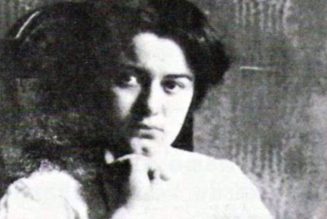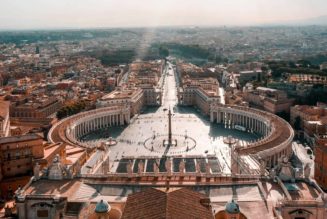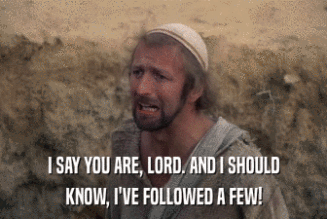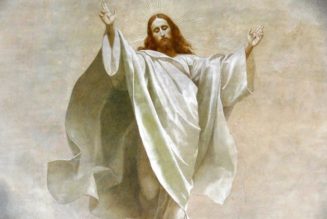ROME – Late August in Rome marks the apex of the summer doldrums, the last chance to get away before the press of the fall begins. Pretty much nothing happens in the city, and that very much includes the Vatican.
Yet while the headquarters of the global Church isn’t producing much news right now, that doesn’t mean the Eternal City can’t still teach some lessons about the faith. Herewith, three vignettes drawn from the “only in Rome” files, each of which has its own insights to offer.
Mary, but not God
Recently I needed to go across town for a business appointment, from our home near the Piazza Mazzini to a location right by the great basilica of Santa Maria Maggiore, “St. Mary Major,” the largest church dedicated to Mary in the Eternal City. I used an app on my phone to summon a taxi, and we set off.
As it turns out, my driver, Franco, works the neighborhood where we live, and just a few days before had driven my wife and I to a local mall. Since that more or less made us friends, he started chatting, asking me among other things if I was planning on stopping off at St. Mary Major to see the famous icon of Maria Salus Populi Romani, or “Mary Health of the Roman People.”
Located in the Borghese Chapel in the basilica, it’s probably the most celebrated icon in Rome. Maria Salus Populi Romani is considered the city’s chief protector and consoler in times of crisis, and over the centuries devotion to it has seen Rome through wars, plagues, pestilences and famines, just as Pope Francis invoked Maria Salus Populi Romani during Italy’s coronavirus lockdown.
Intrigued, I asked Franco if he had a special devotion to the icon. I wasn’t taking notes at the time, but here’s more or less what he said:
“I don’t believe in God, I’m an atheist, and I don’t go to Mass,” he said. “Still, I try to say a ‘Hail Mary’ before ‘Mary Health of the Roman People’ every so often … the streets in this town are dangerous, you know, and I can use the help.”
I decided not to challenge the obvious theological problems with having faith in Mary but not in God, figuring this was a popular religious instinct I should probably encourage. (Truth be told, mature faith is often the result of reverse engineering seemingly illogical instincts we’ve had over the years that took a while to marinate.)
So, I restricted myself to this: “Good for you,” I said.
Is the Pope the Anti-Christ?
There’s a woman in our neighborhood who adores our 1-year-old pug, Gus, and often has little cookies at the ready to feed him when he comes along. Frankly, she’s never seemed to take much of an interest in my wife and I as anything other than delivery vehicles for her latest romp with Gus.
This woman is a Polish immigrant, but she’s thoroughly inculturated in Italy. During the coronavirus quarantine, I once witnessed her getting into a shouting match with an Italian woman outside a grocery store about what the requirements of social distancing meant, and she more than held her own.
The other day as I was coming home, she stopped me to ask what work I do. I told her that I own a small Catholic news agency and that we specialize in coverage of the Vatican and the pope, and that clearly opened the floodgates.
“Do you believe the pope is the anti-Christ?” she asked.
Honestly, I thought she might have been pulling my leg, so I laughingly said “no.” She wasn’t kidding. She proceeded, at some length, to tell me that the pope’s “order to the whole world” to administer communion in the hand as part of the coronavirus protocol was a sacrilege, because the Eucharist is a miracle and therefore, by definition, cannot be contagious.
First, I tried to play the journalist: “Just so you know,” I said, “the pope has never given such an order. Those decisions are made by local dioceses or bishops’ conferences around the world, acting on suggestions from their local public health officials.”
That might have been okay, except I stupidly added: “The only thing you could say about the pope is that he hasn’t countermanded those decisions.”
The reply, of course, led her to insist, “Why not?”
I then tried going on a jag about St. Thomas Aquinas and the idea that grace builds on nature without destroying it, so that bishops with concerns about the natural dimension of administering communion aren’t necessarily denying its supernatural element. She clearly wasn’t buying it, and, after saying they don’t do things this way in Poland, demanded that I ask the pope why he permits such an outrage.
Fortunately, her cell phone rang at that point and I was spared having to decide what to say next.
Moral of the story? Rome is a company town, and just like everyone in D.C. has an opinion about Trump, everybody here has a view about the pope.
Wrong funeral?
Recently Rome’s hometown newspaper, Il Messaggero, carried a piece about a young man who wanted to attend the funeral of his best friend, who’s named Dario. He’d been told more or less where the church was located, and so he set off to pay his respects.
The thing is, this young man, named Luca, was baptized as a Catholic but is non-practicing, and so has never been to Mass since the coronavirus pandemic hit and therefore didn’t realize that everyone in the church would be wearing masks.
When he got to the church he assumed was where the funeral would take place, he found that a service was indeed in progress, but because everyone had masks he couldn’t recognize anyone and thus began to harbor doubts that he was in the right place.
Nervously, he then left and started roaming the neighborhood looking for other churches, and indeed found a couple where services were underway but had the same quandary. Finally, he went back where he started, saw the only two guys there wearing coats and ties, assumed they must have something to do with the funeral, and asked if it was for Dario’s mom. It was, and so he entered the Church just in time to hear the pastor say, “Our condolences for the son, Dario,” and then administer the final blessing.
What was amusing was the tone of annoyance assumed by the young man, Luca, and the writer of the piece, that finding the right Mass was complicated. So vintage Italian: I may not go to church except for rare occasions, but when I do, it’s supposed to be there waiting for me, and I shouldn’t have to work to find it.
Follow John Allen on Twitter at @JohnLAllenJr.










